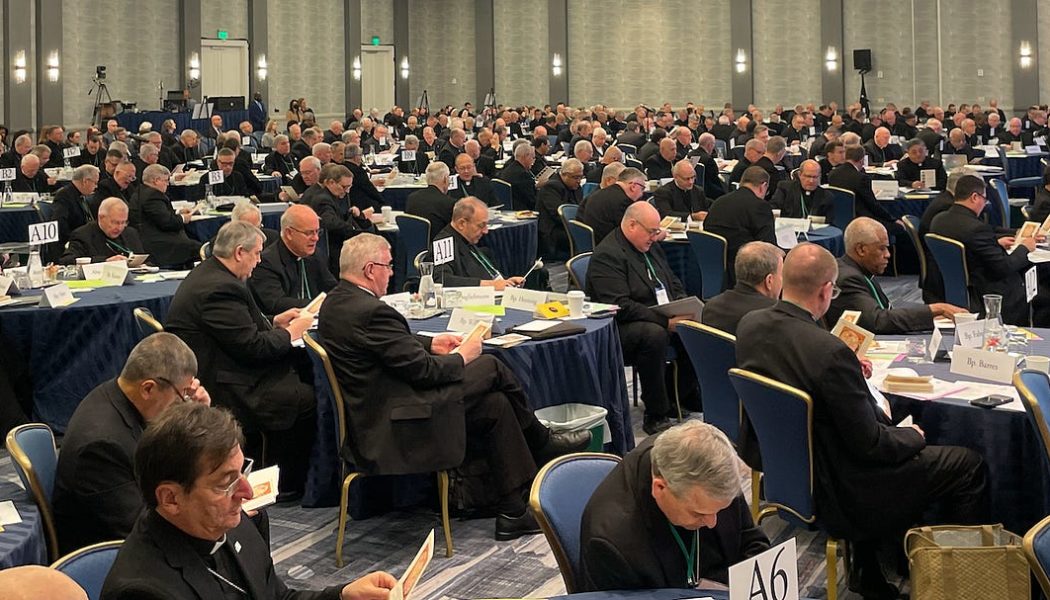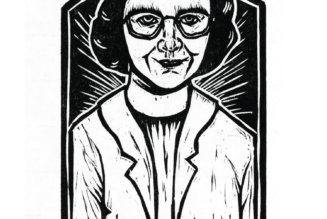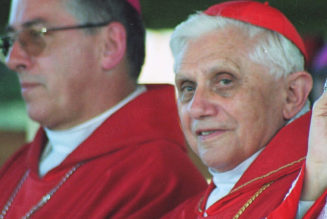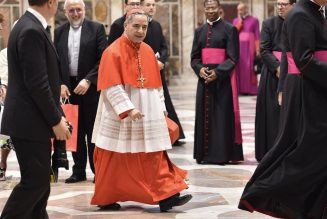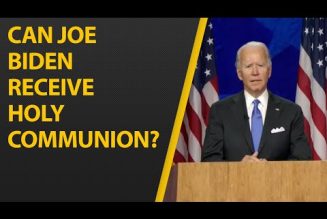A new pastoral document for the pastoral care of indigenous peoples was withdrawn during last month’s meeting of the U.S. bishops, with concern that the document could have created liability issues for the Church among the motivating factors.
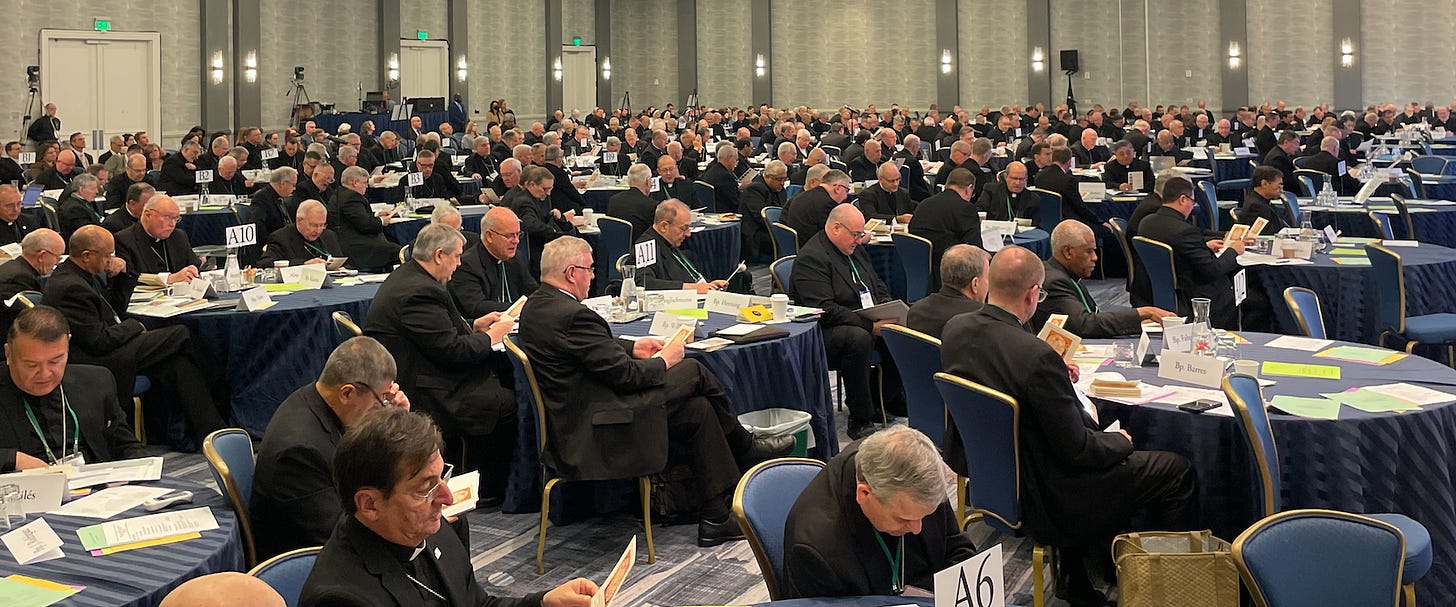
The document, “Keeping Christ’s Promise: A Pastoral Framework for Indigenous Ministry,” drafted by the United States Conference of Catholic Bishops subcommittee on Native American affairs, was slated to be approved by the bishops during the USCCB’s fall plenary assembly in Baltimore in November.
But amid last minute concerns about some of the document’s language, the bishops gaveled into an unscheduled executive session on Nov. 14, at the end of the conference’s afternoon public sessions.
“Brothers, there are some matters that have come to my attention that would best be taken up in executive session” conference president Archbishop Timothy Broglio told the assembly, during its Nov. 14 session..
The archbishop then moved for the bishops to end the public portion of the conference meeting early, with Cardinal Wilton Gregory of Washington seconding the motion.
The unscheduled shift into executive session raised eyebrows among press during the assembly, since the conference had in recent years already moved more of the bishops’ conversations and debate behind closed doors, limiting public access to the proceedings.
Speculation about the topic of the sudden closed-door session increased as bishops subsequently related they had been given a severe admonishment not to discuss the substance of the meeting with journalists.
“All I will say is the meeting started with a warning not to talk to the press about it,” one bishop said at the time. “And that extends even to The Pillar,” the bishop clarified.
But after the executive session, the scheduled vote to approve the pastoral document was removed from the meeting’s agenda Wednesday morning, with a motion to table both discussion and vote until the scheduled spring meeting of the bishops’ conference.
—
Sources close to the conference confirmed to The Pillar that the “Pastoral Framework for Indigenous Ministry” document was the substance of the executive session, and that specific concerns have been raised among some bishops about some language used to recount the Church’s historic involvement in residential schools for Native children.
One source with knowledge of the issues told The Pillar that the document treated several sensitive issues, including language of apology on behalf of the bishops for the Church’s involvement in or failure to oppose institutional discrimination and abuse of Native peoples.
The text was drafted under the direction of the subcommittee on Native American affairs, following a vote by the bishops to commission the project in 2020.
The framework was set to include treatments of specific sensitive issues flagged by the bishops at the time the drafting project was agreed, including the so-called “doctrine of discovery,” urban Native American ministries, and what the subcommittee termed the “boarding school period.”
The final draft of the text was approved by the subcommittee in July, and in September it was supported by the National Advisory Council — the bishops’ conference consultative body, made up of laity, religious, and diocesan priests.
The final text was developed in close collaboration with representatives from several Native peoples and communities, sources close to the drafting process told The Pillar, and received an unanimous vote from the USCCB’s administrative committee to be added to the conference’s November agenda for approval by a vote of the full body.
The text was intended to offer general priorities and themes for diocesan bishops and ministries, Native Catholic leadership, and other Catholic bodies working with Native communities.
But last minute concerns were flagged during the November meeting because the text would also be a formal and official statement by the Catholic bishops of the United States. Sources told The Pillar that some bishops had concern that passages intended to express regret and moral responsibility for that treatment of Native communities could have been interpreted to create potential legal liability for the bishops.
While sources declined to highlight specific passages as the cause of the legal concern, several familiar with the issue told The Pillar that it was language specifically in relation to boarding schools that had been flagged.
A copy of the draft, obtained by The Pillar, emphasizes the importance of working with and valuing the input of Native Catholic leaders.
“In serving Native communities in their respective dioceses, bishops often come to realize the importance of listening to the Elders and other Catholic Native leaders and of recognizing the wisdom of the Holy Spirit speaking through them,” said a draft preface intended to be signed by the subcommittee’s chairman, Bishop Chad Zielinski of New Ulm.
“Much of what these pages offer is the product of dialogues with Native Peoples and of our collective discernment regarding their pastoral needs and the actions needed to address them.”
The draft framework also contains frank acknowledgments of past failures by Church leaders and institutions.
“Today, many North American Indigenous Catholics trace their faith to the decision of their ancestors to embrace Catholicism hundreds of years ago. However, we also shamefully recall that the leaders of the Church did not always prioritize the pastoral care of these first converts or of the generations of Indigenous Catholics who followed,” said the text prepared for the bishops.
“We apologize for any and all neglect and abandonment that Indigenous Catholics in our pastoral care have experienced.”
Part One of the draft document opened with a section headed “A History of Trauma,” which began:
“Among the most significant traumas are epidemics, national policies, and Native boarding schools, which stand out because of their profound effect on family life,” said the text.
“The family systems of many Indigenous Peoples never fully recovered from these tragedies, which often led to broken homes harmed by addiction, domestic abuse, abandonment, and neglect. The Church recognizes that it has played a part in the traumas experienced by Native children.”
The withdrawn text contained a stark assessment of the history and motivations behind boarding schools programs organized by the federal government, which were aimed at the destruction of Native families and cultures, the document said.
“Through its Bureau of Indian Affairs, the government established nearly 4007 boarding schools across the United States and forced many Indigenous children to attend them. In these schools, Indigenous children were forced to abandon their traditional languages, dress, and customs. At an 1892 convention, Captain Richard H. Pratt articulated the underlying belief that the government must ‘kill the Indian, and save the man,’” said the text.
“Boarding schools were seen as one expedient means to achieve this cultural assimilation because they separated Indigenous children from their families and Tribes and ‘Americanized’ them while they were still malleable.”
Although the Church played a role in administering some of these schools, the draft text said that not all Catholic schools were set up for the purposes of Americanization, or to separate children from their families.
“In Alaska, for example, many Church-run boarding schools were created to shelter youth who were orphaned during epidemics or whose parents were experiencing illness or dire poverty and could not care for them,” the document said.
“Many Native alumni of those boarding schools who are still living today express gratitude for the care and educational opportunities they received from the men and women religious who administered mission schools.”
But, the text said, “regardless of the individual experiences at boarding schools,” “the system itself left a legacy of community and individual trauma that broke down family and support systems among Indigenous communities.”
The text drew a direct link between historical traumas, like the forced residential schools, and modern instances of deprivation, addiction, and suicide among Native communities.
The draft framework also listed “transparency” on the Church’s involvement with residential schools and cooperation with independent investigations into them as means of rebuilding trust and effecting reconciliation.
According to the draft text, in 2021 Bishop James Wall, then chairman of the subcommittee, wrote to all U.S. bishops together with Archbishop Paul Coakley, then the chair of the conference’s committee on domestic peace, justice, and human development, offering specific recommendations for bishops to foster healing and reconciliation with Native communities.
Among the recommendations was that bishops “where possible, locate historical information about the boarding schools, graves of Indigenous Americans, and other issues related to the treatment of Indigenous Americans by members of the Church; and make that information accessible to the public.”
Wall and Coakley, who was subsequently elected secretary of the conference, also recommended that bishops should “be open to cooperating fully with Tribal and other government investigations into any Catholic involvement in ethnic abuse. These investigations include, but are not limited to, Native boarding schools.”
Sources close to the conference told The Pillar that although the document was given overwhelming approval by the subcommittee, the conference administrative committee, and the National Advisory Council, and received no objections from other conference committees consulted, some individual bishops raised concerns over the draft framework during the Baltimore meeting.
While appreciative of the considerable collaboration with Native Catholic leaders and communities in the drafting process, and the desire to incorporate as much of their suggested language as possible into the final draft, The Pillar was told that some bishops expressed concern that the language could create legal problems for dioceses which formerly had boarding schools in their territory.
“The point of the document is to build trust and foster healing,” one person with knowledge of the objections told The Pillar. “A small number of bishops worried that some parts were worded could lead to their dioceses being sued, though. That’s obviously a concern for them.”
The text is now being reviewed and revised and is expected to be re-presented to the bishops when they next meet in June 2024.
—
The draft framework also contained a frank acknowledgement of the systemic damage done to Native communities and families, over the course of generations, by European colonialists and a clear refutation of the so-called “doctrine of discovery,” in which 14th and 15th century papal bulls were used by European Catholic powers to justify the colonization of the Americas and subjugation of the Native populations.
“Let us be very clear here: the Catholic Church does not espouse these legal and political concepts or practices,” the draft said.
Earlier this year, the Vatican’s Dicastery for Culture and Education and Dicastery for Promoting Integral Human Development released a joint statement clarifying, with emphasis, that “The ‘doctrine of discovery’ is not part of the teaching of the Catholic Church.”
The dicasteries said that the Church “repudiates those concepts that fail to recognize the inherent human rights of indigenous peoples, including what has become known as the legal and political ‘doctrine of discovery’.”
Comments 9
Services Marketplace – Listings, Bookings & Reviews
